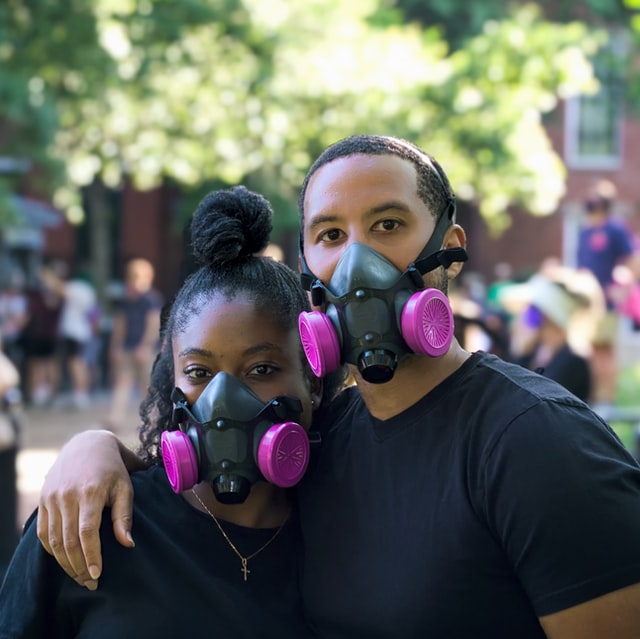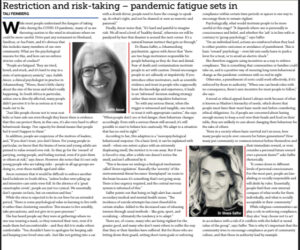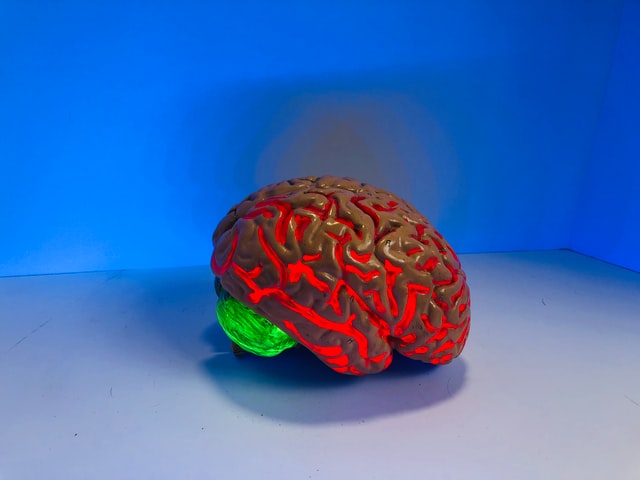


Risk-Taking vs Restriction : Pandemic Fatigue sets in (Authored by Tali Feinberg)



Free – BEST Antidepressant in a Recession
“If you feel bad – do something for someone else and you will feel good “
I’ve seen this listed in many self help manuals .
I do accept this from a neuroscience basis – there’s probably an oxytocin secretion and a slight endorphin rush , and if it’s a planned gift involving anticipatory – related reward, a touch of dopamine too.
But what if you can’t?? Sometimes it’s easy to be a giver or supporter or nurturer of others.
Othertimes, it just isn’t. If one is unwell , physically or mentally , it can be extraordinarily difficult to focus on anything outside ones own pain, discomfort or distress.
Esther Jungreis, a Holocaust survivor who became an American religious leader, recounts this story , which hits a pure-truth chord every time I recount it…..
There was a very rich guy who owned a Texas based oil company . His son grew up and joined the firm . One year there was a terrible recession that hit the world. The son half-joked “ Gee dad , things are so tight now. We could really use the $300 000 that the business donated to charity last year” .
The dad turned to his son.” Dont you know?” he said, “All that we have is that which we give? I only wish, that when i had the chance, I had given more”.

Sometimes it can be very difficult to give.
Especially in a recession . But this Texas dude could well be right.
Why wait till its hard ?

More on Mindfulness : “Wherever you go – at least get halfway there “
An old Zen proverb says , “ Wherever you go, there you are”.
This statement may sound obvious, but it’s profound . We humans have the ability to “ think ourselves “ anywhere. We have a capacity to choose where to direct our attention. And if we can’t, we can easily learn this skill.
This is the basis of Mindfulness.
A focused choice, putting attention into the present moment.So many people are scared of meditating. We know how difficult it is to clear our minds . But mindfulness practice merely asks that you focus on observing your thought , watching them dance around your head. The thing is not to have any commentary or judgement about the content of such thoughts – just to be aware of them.
You don’t have to sit on the floor to meditate. Mindfulness meditation can be practiced anywhere in any position, as long as the mind is brought to the present moment – to be aware, alert and non – judgemental toward ourselves and towards others.

Remember the advice “ take a deep breath “?
It remains one of the most instant mood changers and method of calming. It’s free, it’s instantly available and it gets oxygen to your brain.
In fact , with three conscious breaths we can release the tensions in our body and mind and return to a cool and calm state of presence. That’s all it takes. Three unhurried breaths. No Rush.
Why should we practice mindfulness ?
It sounds easy enough to do, but it really should be practised, daily . It’s like exercising a muscle.
With practice and perseverance, the idea is that we can change the basic beat of our neural rhythm in a positive way.
This reduces constant stimulation of regions of the brain that cause unpleasant feelings of anxiety.
That’s a good reason to practice, but there’s more. The benefit becomes recursive.
Without the burden of anxiety, a person naturally becomes more mindful in their daily lives. They become less forgetful, because they are paying more attention. They report being generally happier with greater levels of satisfaction.
Mindfulness in clinical Medicine
Jon Kabat-Zinn, PhD, the MIT graduate who brought the practice of mindfulness to medicine, entitled one of his books “ Wherever you go, there you are”.
Dr Kabat- Zinn is the founder of the MBSR program ( mindfulness based stress reduction ) which has evidence – based clinical benefit in all sorts of chronic medical illnesses. This practice also boosts the immune system .
Mindfulness – based Cognitive Therapy ( MBCT) is used as an effective treatment for depression as well as prevention of relapse.
How do I start?
Many of you are doing it already
Did you know that many religious practices are designed to help focus attention and awareness on a moment.
As an example, grace before meals, or blessing the foods we eat, requires us to take a moment to immerse ourselves wholly in an aspect of the present. We sanctify the moment.

If you play a sport such as golf, you’re doing it as you focus on your next swing. Total attention is placed on the present. If you cannot attend in such a manner you won’t be a very good golfer.
So, I’d guess that many of you are already halfway there. I have just invented my own saying: wherever you go, at least get halfway there. Because by then, the effort it takes to give up and go home is the same as that required to persevere.
My advice on the easiest way to start mindfulness meditation is by following a simple practice of observing your breath.
As you get more comfortable with this practice, you can begin to consciously modify your breathing .
I really find the 4-7-8 breath very easy and useful. Dr Andrew Weil, a Harvard graduate and practitioner of integrative medicine in Arizona, details the method .
Breathe in through your nose , counting to 4. Hold the breath in to a count of 7. Then open your lips and slowly and powerfully exhale to a count of 8. Repeat at least four times. I encourage you to give it a try .
As Confucius said – wherever you go, go with all your heart.
Meet Dr Andrew Weil :The 4-7-8 Breath

Serotonin – the Humanizing Neurochemical
Serotonin and Mood
Serotonin , or 5 Hydroxytryptamine, is one of three major mood- defining chemicals in the brain. It is manufactured inside certain brain cells , from a protein ingredient called tryptophan. Many ask me if Serotonin is the “happiness” chemical . Not quite , but , like money , it helps.
It is the “ chemical of satisfaction”. Of peace . Of mediation and moderation .It’s associated with increased patience, tolerance toward ones fellow man , as well as feeling less affected emotionally by usual triggers- all those small daily occurrences that annoy or irk or upset us. And it promotes healthy sleep patterns.
I think that the remarkable thing about serotonin is that it seems to be the chemical that defines us as human , and not animal . What makes us uniquely human, different from other mammals? We all have animalistic basic drives, but what causes behaviour to be moderated ?
Free Choice
Humans have the implicit ability to choose their behaviors and actions. Instead of merely reacting to environmental stimuli , we have the ability to consider … and thus Respond.
If a lion is hungry , he must eat. And if there’s no food , he will eat you!
But you can decide that you’re skipping a meal for diet purposes, or because you are fasting for religious reasons .
An animal is incapable of this.
Reaction versus Response
![]()
As serotonin networks slow down , you would find yourself less able to temper your inner emotional responses. This leads to a problem controlling consequent behavioural reactions. A common example of this is a road rage episode. When serotonin networks are functioning at the correct speed , you should be able to do the following: look at the person who offended you, count to ten , breathe, and calmly decide whether to strike that person , or walk away , or hum a melody . I’m not judging these responses, but merely making the point that there is an ability to choose ones behavioural output – to respond instead of react. A dysfunctional serotonin system seems to render us more ‘animalistic’ Serotonin helps our ‘Human-ness’
A Glass of Milk?
How can we raise the frequency of our serotonin circuits , thereby refining our behaviour ? The answer is that this can be achieved in a variety of different ways – from listening to certain types of music ( try the featured Bach piece), practising mindfulness, taking serotonin boosting medications, and eating specific foodstuffs.
Have you ever heard – perhaps from a granny – that if you are stressed or can’t sleep, you should drink a glass of warm milk? Now, milk contains tryptophan, the essential building block of serotonin. I am still intrigued that a Ugandan patient remembers being given this remedy by his grandmother. and my gran from Paarl imparted the very same pearl. Clearly the drive to fire up ones serotonergic circuitry, to be calmer, sleep better and behave responsibly, in human fashion, is an age-old wisdom.
Bach Will Speed up Your Serotonin Everytime

Immune Dysfunction Kills in Covid but can it cause Depression?
We are learning more and more about Covid -19 – specifically about what kills.
The term “ Cytokine Storm “ is used to describe a massive build up of the body’s own immune system, with an outpouring of “ fighter – molecules”. These ‘soldiers’ are meant to decimate the “intruder” – coronavirus. In people who become alarmingly ill it seems that this intense immune response actually attacks the hosts own tissues and causes the brunt of the damage .
A cell which divides in a manner that’s out of control becomes a tumor…………….. An out of control immune system kills the host – it’s like soldiers going to war against their own country .
In Susannah Calahan’s book, entitled “Brain on fire – My month of Madness” , the author – a New York journalist, describes how she experienced symptoms of psychosis , and seizures… but that she was told that doctors could find nothing wrong . The tests she underwent were negative. Until a smart doctor found the cause – Autoimmune Encephalitis (anti NMDA receptor encephalitis). Dr Souhel Najjar is a neurologist who identified the mechanism of interaction between the immune system and the central nervous system. This rare brain disease manifests with a strange combination of neurological and psychiatric symptoms – due to an immune system that’s making warheads and targeting a part of the brain. The story of the journalist and the neurologist was made into a drama movie.
Recent research has focused on the possible role of inflammation as a cause of brain disorders, including depression. A person with diagnosed depression complains of low energy and cannot concentrate. They commonly stay in bed, and lose interest in the outside world. They therefore appear ‘sick’.
There is certainly mounting evidence in the literature of a biological association for at least a certain spectrum of people diagnosed with depression as in fact tests for inflammatory markers are raised in some depressed populations. But what causes the inflammation that becomes overdone, and thus self-defeating?
Stress
One idea is that as we live with greater amounts of stress, our body mounts an immune reaction to deal with stress itself. This response leads to an inflammatory build up in the brain – which can then manifest clinically with signs of depression.
Other conditions understood to be caused at least in part, by an out-of – control immune response , with raised neuroinflammatory markers are brain diseases such as Alzheimer’s and Parkinson’s, as well as certain brain tumours . Auto-immune diseases such as Lupus and Rheumatoid arthritis and some types of thyroid disease also fall into this category .
While medical management of inflammation may involve use of immune suppresssants including corticosteroids and dexamethasone , and various antidepressant medications are available to treat serious depression, the one main factor we can try to address is the level of stress we perceive in our daily lives. We cannot avoid or escape stress, but we can minimise the impact it has on our bodies and on our Minds.
Future posts will detail tools for Stress reduction , but in brief , we should limit exposure to disturbing and anxiety- provoking media, maintain healthy eating and sleeping patterns, exercise, foster core relationships , and make time to have fun and relax .
Or we can do as Michael Singer, author of The Untethered Soul, suggests…..” It is not life’s events that are causing problems or stress. It is your resistance to life’s events that is causing this experience. Since the problem is caused by using your will to resist the reality of life passing through you, the solution is obvious – stop resisting.”
